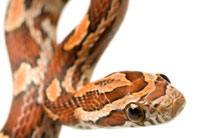Delaware ‘Exotic’ Animal Regulations deadline nearing.
Click image to enlarge Potentially regulated but common pets, such as the cornsnake, are not yet on the exempt list. |
The Delaware Department of Agriculture is accepting public comments through Aug. 1, 2009, on its proposed regulations governing possession and sell of exotic animals in the state.
The regulations cover “wild” mammals and reptiles “not native to or generally found in Delaware” and not included on an exempt list maintained by the state veterinarian.
Currently exempt animals include hamsters, iguanas, gerbils, mice, guinea pigs, bearded dragons, hedgehogs, Asian water monitors, basilisks, ferrets, tegu, chinchillas, geckos, chameleons, and sugar gliders.
However, potentially regulated but common pet animals not on the exempt list include anoles, rats, rabbits, hermit crabs, boas, ball pythons, corn snakes, garter snakes, milk snakes, ribbon snakes, box turtles, various tortoises (Russian, Leopard, red-footed) and Savannah monitors, according to the Pet Industry Joint Advisory Council (PIJAC), which issued a pet industry alert about the proposed regulations.
The proposed regulations establish a permit system for owning or selling regulated animals as well as enclosure and welfare requirements that permit holders must meet.
Individual pet owners would need a permit for each animal kept as a pet and could be subject to background checks by the agriculture department as well as premises inspections to “confirm the health and humane treatment of the exotic.” They must also obtain permits prior to buying a regulated animal. A previous version of the regulation allowed pet owners to apply for a permit within 10 days of an animal’s purchase.
Pet owners would not be able to breed regulated animals.
Sales permit holders, including pet stores, would be able to breed some regulated animals.
To obtain an annual, non-transferrable sales permit, however, a pet store must hold a current Delaware business license, be subject to a possible background check and meet several requirements.
These requirements include ensuring potential buyers possess the appropriate exotic animal permit from the state, confirming the buyer’s personal identification matches information on their exotic animal permit, providing the buyer with written information about the animal’s enclosure and welfare requirements, notifying the buyer that local laws might further govern ownership of an exotic, and guaranteeing all exotic animals put up for sale are in good health.
In addition, sellers must notify the agriculture department monthly with names and contact information of purchasers, as well as a description of each animal sold. For sales to parties outside of Delaware, the seller must maintain a record of the sale and notify the appropriate state veterinarian or government agency in the buyer’s state of the sale.
Failure to obtain or renew a permit would allow the state veterinarian to order the seizure and disposal of any regulated exotics without a hearing.
All permit holders would be required to notify the agriculture department monthly of any births or deaths of their animals.
Comments can be submitted to: Acting State Veterinarian, Caroline Hughes, VMD, Delaware Department of Agriculture, 2320 S. DuPont Highway, Dover, DE 19901.
Click here to read proposed regulations.


